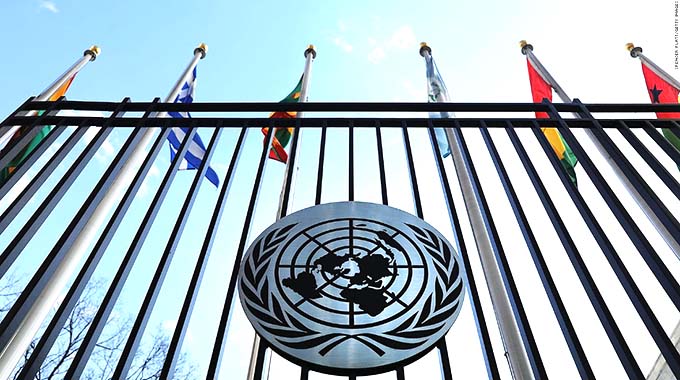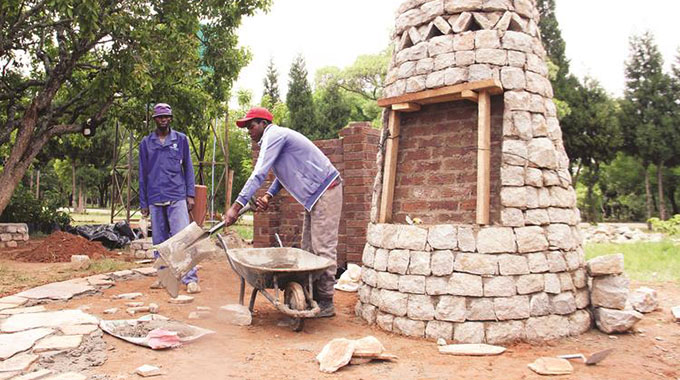Celebrating youths for standing up for human rights

Georges van Montfort Our Children Our Future
The United Nations team in Zimbabwe paid tribute to Zimbabwe’s agile youths during a human rights debate event convened by the Zimbabwe Human Rights Commission on December 10, 2019 on the occasion of the International Human Rights Day.
The day was befittingly celebrated under a global theme — “youth standing up for human rights”. It was inspiring to see young Zimbabweans debate on wide-ranging topics of human rights. Those who participated in the human rights debate were all winners as their messages and perspectives were inspiring.
One of the major takeaways for me was that when people’s freedom of expression and assembly are respected and harnessed, democracy and innovation thrive.
The power of free flow of ideas, which is the cornerstone of democracy, has allowed humanity to survive, adapt and make unprecedented breakthrough in science, technology, and in general significant progress in human development.
In the Universal Declaration of Human Rights, whose 71st anniversary was celebrated at the event, Article 19, states that the fundamental right of freedom of expression encompasses the freedom “to seek, receive and impart information and ideas through any media, regardless of frontiers.”
Young people account for one out of every six people. There are more adolescents and young adults alive today than at any other time in human history.
Africa is no stranger to this as almost 60 percent of Africa’s population in 2019 is under the age of 25, making Africa the world’s youngest continent.
According to demographic projections, the median age in Africa is going to be 19.8 in 2020. Therefore, the way we engage with young people today will determine the prospects for sustainable development and peace.
Dedicating the day to celebrating the role of young people in bringing human rights to life, UN Secretary-General Mr António Guterres said, “every single person is entitled to all rights: civil, political, economic, social and cultural. Regardless of where they live. Regardless of race, ethnicity, religion, social origin, gender, sexual orientation, political or other opinion, disability or income, or any other status.”
Zimbabwe is a nation of young people, and it makes the case for being its most vibrant, most innovative and exciting.
It’s young and resilient professionals are connecting with each other and across the African continent, leading accelerator labs and green innovation hubs to find local solutions to local challenges.
Its lawyers, human rights advocates, writers and poets are inspiring the nation and the world with their strength and soul.
Despite protracted challenges of unemployment, economic and drought shocks, young people in Zimbabwe remain active in advancing the rights of women and girls as witnessed during the just ended 16 days of activism against gender-based violence.
Youths with disabilities in Zimbabwe have also recently come together to stand up for their greater inclusion in society, development discourse and the realisation of their human rights.
On the occasion of the 30th Anniversary of the Convention on the Rights of the Child recently celebrated with the Parliament of Zimbabwe, it was very refreshing to hear the views of junior parliamentarians, children and young people debating around children’s rights and making insightful contributions in advancing their rights.
This is a good practice that needs to be replicated systematically in all the work we do involving young people. In her statement on Human Rights Day, UN High Commissioner for Human Rights Michelle Bachelet said, “We have a duty to ensure young people’s voices are heard. All human beings have a right to participate in decisions that have impact on their lives.”
Yet young people face specific risks, including age-based discrimination which intersects with disproportionate social, economic and political barriers which prevent them from achieving their full potential.
To address some of these discriminatory practices, the UN has long recognised that young people are a major human resource for development and key agents for social change and innovation.
As such, participation in decision-making is a key priority area of the UN agenda on youths and the organisation works in partnership with youths to ensure that they are meaningfully engaged and their human rights are respected, fulfilled and protected.
Thousands of young Zimbabweans showed their commitment to green economy through demonstrating their innovative prowess for a healthy environment during a week-long exhibition and debate organised on the 74th anniversary of the UN at the National Arts Gallery in October 2019.
Drawn from across the country and diverse political, social and economic backgrounds, some 1 500 young Zimbabweans under #ZimYouth4SDGs convened a high-level national dialogue in September 2019.
The dialogue deliberated on quality education to link higher learning institutions and research centres to local business solutions, promoting freedom of expression and the need for youths to participate in decision making processes to pro-actively inform national policies in the ongoing economic and democratic governance reforms.
Furthermore, a new initiative called Youth Connekt is providing a holistic solution to alleviate the challenges faced by African youths, including Zimbabweans by widening the pool of economic, social and civic leadership opportunities. The United Nations supports human rights as an end and a means for peace and sustainable development.
The United Nations’ consistent engagement with young people in Zimbabwe emanates from the strong belief that the youths as the majority of the population and dynamic force are key to unlocking the economic and democratic governance challenges of the country.
The United Nations engagement in Zimbabwe is guided by international human rights instruments, the 2030 Agenda for Sustainable Development and its 17 Goals under the principle of “leave no-one behind”.
Equally important, the United Nations in Zimbabwe integrates human rights together with reinforcing principles of humanity, neutrality, impartiality and independence when delivering humanitarian support to millions of vulnerable communities affected by drought, Cyclone Idai, and economic challenges in rural and urban centres. Given the unprecedented scale of the current humanitarian needs, it is ever more important to pro-actively promote the humanitarian principles at all levels.
The United Nations in Zimbabwe will continue to promote human rights from its ardent belief that when the rights of citizens are fulfilled, they meaningfully participate in civic activities and betterment of their life, family, community and country by actively working towards realising their aspirations and the 2030 Agenda for Sustainable Development.
The United Nations in Zimbabwe remains committed to working with young Zimbabweans, relevant authorities and development partners to ensure that the people of Zimbabwe are able to realise and enjoy their rights to basic needs such as public health, medical care, food, water, housing, education and the right to decent jobs with just and favourable conditions.
The piece is a near-verbatim of UN statement on International Human Rights Day as delivered by Mr Georges Van Montfort, UNDP Resident Representative in Zimbabwe.










Comments